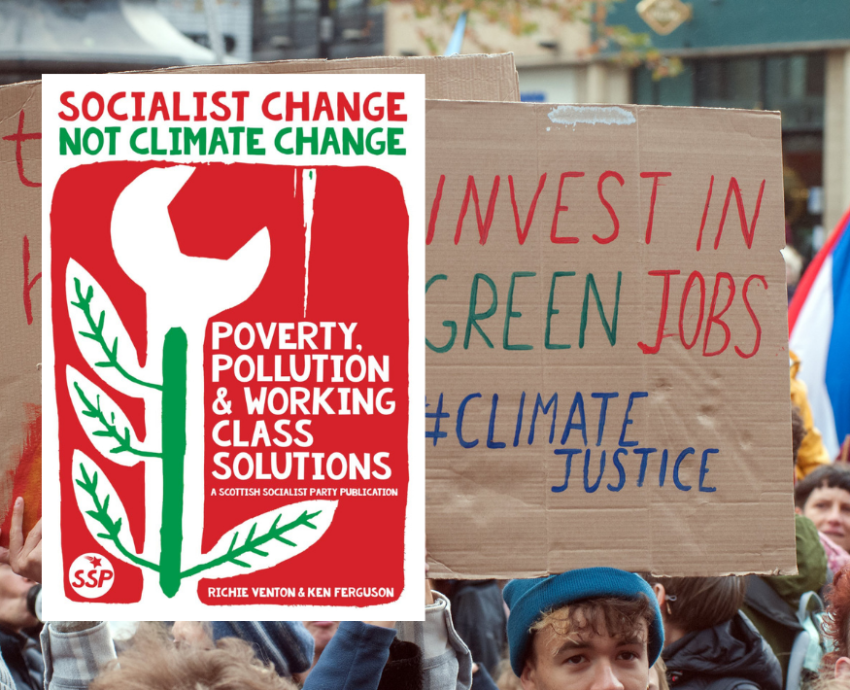
Socialist Change Not Climate Change: Poverty, Pollution and Working Class Solutions
by Richie Venton and Ken Ferguson
Scottish Socialist Party Publication, 2021, $11.50, 64 pages
Available here
This attractively produced and well-written Scottish Socialist Party (SSP) pamphlet, co-authored by the party's national workplace organiser Richie Venton and Scottish Socialist Voice editor Ken Ferguson, was published to coincide with the United Nations COP 26 Climate Change conference in Glasgow last October.
It traces the roots of the existential threat posed by human-generated climate change to contemporary capitalism’s inexorable drive for profit.
Venton and Ferguson say of capitalism that, since its inception 400 year ago, it “has transformed the world from subsistence peasant serfdom to a world of dazzling complexity and choice in digital devices, consumer goods, cars and foods from a planetary menu, now stands at the peak of its power”.
But, behind the glittering façade, capitalism “also reigns over a world where millions have no clean drinking water, rudimentary shelter, face hunger and poverty and live with the consequences of war”.
In a specifically Scottish context, two manifestations of the inherently contradictory nature of the capitalist economic structure appear in the production and consumption of energy.
Venton and Ferguson argue that Scotland is one of the energy-richest countries in Europe. The "Big Six" energy companies that dominate domestic supplies make massive profits from year to year.
But one-in-four Scottish households shiver through the harsh winter because of an inability to pay for adequate heating.
Moreover, the “wind, waves and plentiful rain sweeping Scotland, and the disproportionately large share of shallow waters offshore, hand us the opportunity to become — in the infamous, unfulfilled promise of the then-First Minister, Alex Salmond — ‘the Saudi Arabia of renewables'”.
But this vast potential is largely untapped.
As Mary Church, Head of Campaigns at Friends of the Earth Scotland, puts it in the January/February 2022 Scottish Left Review, a longstanding policy of the Scottish government is to “drill every last drop of oil and gas from the North Sea”.
And when steps in the direction of renewable energy are taken, the capitalist context results in situations that would be laughable if the planet weren’t on fire.
Venton and Ferguson cite the case of the Neart Na Gaoithe wind farm off the coast of Fife. Nearby there were two Burntisland Fabrications (BiFab) facilities ready and willing with skilled workers capable of building the jackets for the offshore turbines.
However, “under the aegis of ‘competitive market capitalism’, the contracts were dished out mostly to a cheap labour manufacturer in Indonesia … then hauled 7000 miles across the oceans back to Fife coastal waters, spewing out pollution from the diesel burning barges, returning the manufactured jackets to within 15 miles of the mothballed BiFab yards”.
In place of this madness, Venton and Ferguson argue that what is required is a Socialist Green New Deal, a “planned, rapid, worker-led transition to green energy production”. They cite the recent Green Jobs in Scotland report from the Scottish Trades Union Council, which estimates that this could generate up to 70,000 new jobs.
They place this idea in the context of a range of historical working-class struggles relating to environmental issues in the USA, Scotland, Northern Ireland and Australia, and argue trenchantly that the environmental movement needs the organised working class at its core.
Ultimately, “the climate crisis is not a generational issue, it's a class issue”.
This pamphlet can be recommended to any budding climate activist looking for a succinct account of the economic and political origins of the contemporary climate climate crisis.